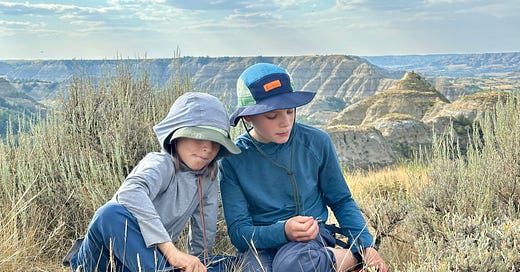“Hey, Mom…You know most people aren’t remembered.”
We had reached the turn-around point of our short hike through the tall grasses of the Maah Daah Hey trail near Theodore Roosevelt National Park, and this is the thought Elliot shared. He said it nonchalantly, sort of matter-of-factly but there was a hint of fear and uncertainty in his voice - like he was backing into a topic he wasn’t sure about.
The music of Hamilton has been the soundtrack of our trip, and the boys have memorized all the lyrics. Hearing his thought, I can’t help but hear echos of these songs:
“Who lives, who dies, who tells your story”
“He will never be satisfied”
“That would be enough”
The theme of legacy resounds in Hamilton and the depth of these lyrics have woven their way into the subconscious of my tiny philosopher.
We sat down at the overlook, and he and his brother picked seeds from the grass stalks while our dog rested after welcomed miles of unleashed bounding.
“Tell us more about what you are thinking,” I encouraged.
“Well, most people aren’t written about in books, and they probably get forgotten after a few generations. I mean I don’t remember my great great grandparents.”
“You are right, I replied. “How do you feel about that?”
“I don’t really know.”
I could see the wheels turning in both our boys’ minds as they thought about what this meant. Does the fact that most people are forgotten diminish our existence? How much do our lives matter if people don’t talk about us when we are gone?
“What kind of person do you think you want to be?,” I asked. “One that is written about in history books and talked about years later? Or does it feel like enough to live a quieter life, to be remembered by those close to you for a few generations?”
While he thought, our older son wondered aloud if we are remembered by the Earth, by the animals and plants who are nourished by our remains.
As a parent, you get quite used to unexpected questions. Here’s a sampling from the past week:
What does ‘interpretation’ mean?
If there were no consequences, how much cheese could our dog eat?
Do insects have hearts?
What do people do with your clothing when you die?
How far does a mosquito bite into your skin?
How many years would it take to rub off your nose?
Some of these questions I have ready answers to, and some I can look up. Some are far-fetched head-scratchers, and others have no answers at all because they are the very same questions, I wonder about.
When we ponder the meaning of our lives, it shows us the power we have to decide how we want to live, who we want to live for and how we want to be remembered. On one hand, this feels like an immense amount of pressure, and on the other, an open book of possibility.
That’s a lot to navigate for any of us, let alone an 8-year old.
We started walking again and eventually Elliot said, “I think I am still too young to make such a big decision.”
“Fair enough,” I said, and we continued our stroll across the prairie.
When we have time to let it, our minds can wander to unexpected places, taking us along unknown trails and through unmapped territory. This long trip away from our everyday has given us this space for our minds to take their own adventures.
As my own mind travels, I often feel that my rate of unearthing new questions outpaces my discovery of answers. This feels daunting, like there is just too much that I’ll never know, but then I turn around and head back, realizing that the terrain has become more familiar. I have charted something new, filed away memories and filled in a piece of the map that I didn’t know before. Sometimes we are learning more than we realize.
My young ones are just beginning to understand their own maps, and as a parent, I get to help point them in directions and encourage them to explore. I get to answer questions where I can and ask them questions when I don’t have the answer or prefer that they come up with their own.
I am still trying to decide my own answer to this question of legacy, and I wade through the lyrics of Hamilton. What’s enough when it comes to my sphere of influence and the ripples I want to leave in my wake?
I like Elliot’s answer, and perhaps it holds for me too. Maybe I am not ready to decide one way or the other. Perhaps we should let our natural contributions speak for themselves and determine our legacy organically. Would this fill our need to feel remembered, to feel important, to feel that this life has been meaningful?
For now, I’m content to keep living, to keep exploring the world, writing about it and letting it take me where it will, regardless of how I’ll be remembered for it. And for my kids, I want them to know that this life matters whether they influence one person or generations. Though we may never know exactly how, the world will be forever different because each of us has been a part of it.






I love conversing with Elliot. He always has an insight I would miss because I am old. Enjoy your trip and tell the family hello.
Your son is a philosopher at heart. Thank you for sharing. I appreciate the pondering questions of how we'd like to be remembered.